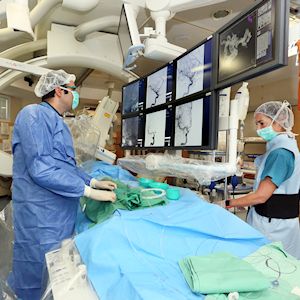News and Events
Rambam Performed One-fifth of 2016 Brain Catheterizations in Israel
There are only three brain catheterization specialists in Israel’s north; two are at Rambam. This treatment is increasingly being used. Rambam physicians performed 20% of all such procedures in Israel.
 A brain catheterization being performed at Rambam.
Photography: Pioter Fliter, RHCC
A brain catheterization being performed at Rambam.
Photography: Pioter Fliter, RHCC
Between 250 and 300 brain catheterizations were performed in Israel in 2016, according to a survey by the Israel Neurological Association (NASIS), and this number has been on the rise in recent years. Fifty-eight of the treatments in 2016 were conducted at the Rambam Health Care Campus—approximately one-fifth of all such procedures performed nationally.
Since the beginning of 2017, 60 brain catheterizations for stroke have been performed at Rambam. Based on statistical calculations, another 40 treatments are expected to be performed at the hospital by the end of the year—a 70% increase in the number of stroke treatments.
The largest academic hospital in the region, Rambam is the referral center for 12 hospitals and the only Level 1 trauma provider in the north. Hence, Rambam has gained great expertise in treating difficult and complex cases, utilizing some of the most advanced innovative technologies available. Brain catheterization is a skill that can save patients from severe disabilities and complications leading to death, but it is available only in a few Israeli medical centers. In Northern Israel there are only physicians with this skill: One works in the Galilee Medical Center in Nahariya, and two work at Rambam: Dr. Eitan Abergel and Dr. Rotem Sivan.
While some 15% of stroke cases are due to brain hemorrhage, 85% of all cases are due to ischemic blockage. The window of opportunity to treat clotting for ischemic stroke is four and a half hours after the onset of the event, and every passing minute is critical. This window can be extended to six hours or more if brain catheterization is performed, often saving the lives of patients with a blockage in the large blood vessels of the brain.
"Brain catheterization is a delicate and complex skill that requires specific training," explains Dr. Eitan Abergel, who was recently appointed director of the Invasive Neuroradiology Unit at Rambam and performs brain catheterizations at the hospital. "Our job is to reach the blocked artery in the brain and to treat the occlusion by removing the clot. Approximately 10,000 Israelis suffer a stroke every year, most of which are due to an obstruction, a problem that can be best treated by a brain catheterization. Unfortunately, Israel doesn’t have enough doctors with the necessary training. However, Rambam provides 24/7 availability to the entire northern region; the data speaks for itself, more and more people are turning to us for stroke care, and their lives are being saved."

